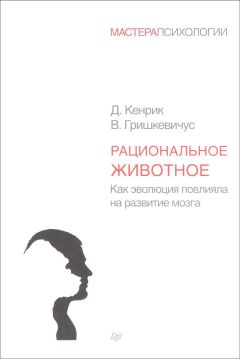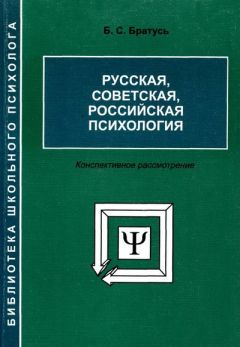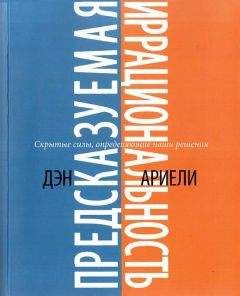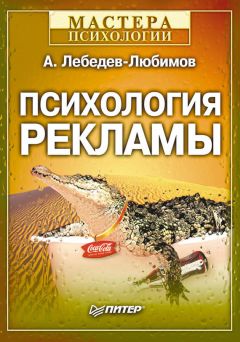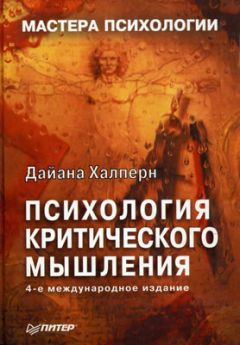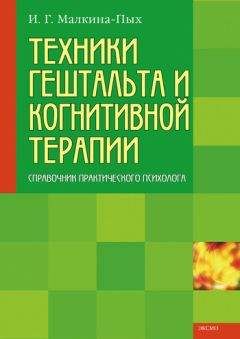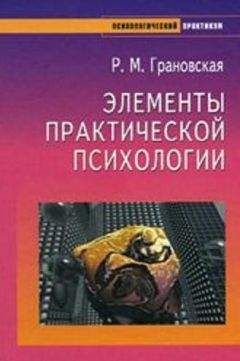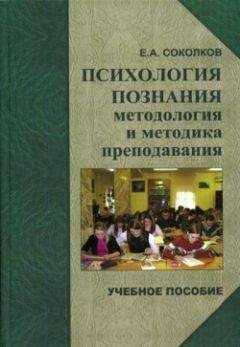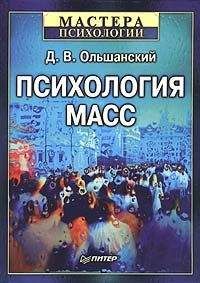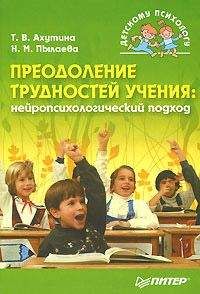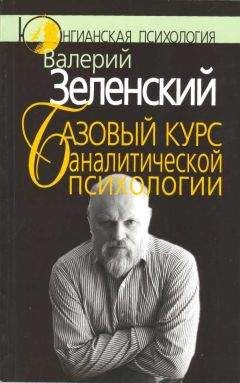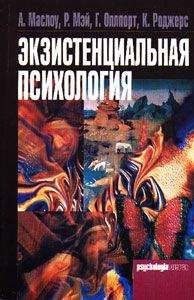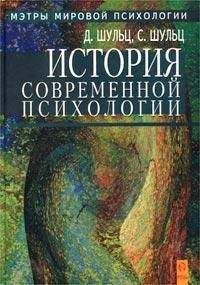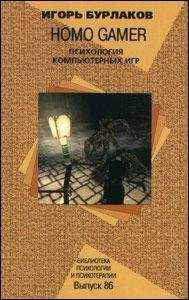Дайана Халперн - Психология критического мышления

Скачивание начинается... Если скачивание не началось автоматически, пожалуйста нажмите на эту ссылку.
Жалоба
Напишите нам, и мы в срочном порядке примем меры.
Описание книги "Психология критического мышления"
Описание и краткое содержание "Психология критического мышления" читать бесплатно онлайн.
Эта книга написана в помощь тем, кто хочет научиться думать современно. Опираясь на новейшие достижения когнитивной психологии и свой уникальный педагогический опыт, Дайана Халперн разработала эффективную программу обучения навыкам «критического мышления». Данная книга может быть широко использована в преподавательской и методи-ческой работе, окажет неоценимую помощь в самообразовании, а кроме того, является свое-образным путеводителем по современной когнитивной психологии. Рекомендуется психологам, педагогам, философам, а также всем интересующимся когнитивной психологией, психологией творчества, теорией принятия решений.
Scholnick E. K., Friedman S. L. (1987). The planning construct in the psychological literature. In S. L. Friedman, E. K. Scholnick amp; R. R. Cocking (Eds.), Blueprints for thinking: The role of planning in cognitive development (pp. 3-38). Cambridge. MA: Cambridge University Press.
ScrivenM. (1976). Reasoning. New York: McGraw-Hill.
Searleman A., Herrmann D. (1994). Memory from a broader perspective. New York: McGraw-Hill.
Sears A., Parsons J. (1991). Towards critical thinking as an ethic. Theory and Research in Social Education, 19(1), 45-68.
Seech Z. (1993). Open minds and everyday reasoning. Belmont, CA: Wadsworth.
Segal /. W., Chipman S. E, Glaser R. (Eds.). (1985). Thinking and learning skills: Vol. I. Relating instruction to research. Hillsdale, NJ: Lawrence Erlbaum Associates.
Seligman M. (1991). Learned optimism. New York: Knopf.
Shaklee H. (1987, November). Estimating cumulative risk: Flood and contraceptive failure. Paper presented at the Twenty-Eighth Annual Meeting of the Psychonomic Society, Seattle, WA.
Shanteau J., Grier M., Johnson /., Bemer E. (1991). Teaching decision-making skills to student nurses. In J. Baron amp; R. V. Brown (Eds.), Teaching decision making to adolescents (pp. 185-206). Hills-dale, NJ: Lawrence Erlbaum Associates.
Shaver K. G. (1981). Principles of social psychology. Cambridge, MA: Winthrop.
Shaw G. A., de Mers S. T. (1986-1987). Relationships between imagery and creativity in high-IQ children. Imagination, Cognition amp; Personality, 6(3), 247-262.
Shermer M. (1992). Anecdotes do not make a science: The skeptics reply. Skeptic, 1, 18-19.
Shubik M. (1971). The dollar auction game: A paradox in noncooperative behavior and escalation. Journal of Conflict Resolution, 15, 109-111.
Siegel E. (1991, May). Persuasion and decision-making. APS Observer, p. 8.
Simon H. A. (1977). The psychology of scientific problem solving. In H. A. Simon (Ed.), Models of discovery. Dordrecht, Netherlands: D. Reidel.
Simon H. A., Kaplan С A. (1989). In M. I. Posner (Ed.), Foundations of cognitive sciences (pp. 1 -47). Cambridge, MA: MIT Press.
Simonson /., Nowlis, S. M., Simonson, Y. (1993). The effect of irrelevant preference arguments on consumer choice. Journal of Consumer Psychology, 2, 287-306.
Singer В., Benassi V. A. (1981). Occult beliefs. American Scientist, 69, 49-55.
Sinnott J. D. (Ed.). (1989). Everyday problem solving: Theory and applications. New York: Praeger.
Skeptic. (1995). Race and IQ.3.
Slovic P. (1987). Perception of risk- Science, 236,, 280-285.
Slovic P., Fischhoff, Lichtenstein S. (1986). In H. Arkes amp; K. R. Hammond (Eds.), Judgment and decision making; An interdisciplinary reader. Cambridge, MA: Cambridge University Press.
Smedslund J. (1963). The concept of correlation in adults. Scandinavian Journal of Psychology, 44, 165-173.
Smith L. (1992, June 2). Rick's place revisited. The Los Angeles Times, p. Al.
Smith M. U. (1992). Expertise and the organization of knowledge: Unexpected differences among genetic counselors faculty, and students on problem categorization tasks. Journal of Research in Science Teaching, 29(2), 179-205.
Smith M. U. (1988). Successful and unsuccessful problem solving in classical genetic pedigrees. Journal of Research in Science Teaching. 25(6), 411-433.
Smith R. A. (1995). Challenging your perceptions: Thinking critically about psychology. Pacific Grove, CA: Brooks/Cole.
Smith S. M., Btankenship S. Я. (1991). Incubation and the persistence of fixation in problem solving. American journal of Psychology, 104(1), 61-87.
Snow R. E. (1986). Individual differences and the design of educational programs. American Psychologist ,41, 1029-1034.
Snydei M., Uranowitz S. W. (1978). Reconstructing the past: Some cognitive consequences of person perception. Journal of Personality and Social Psychology, 36,941-950.
Solorzano L. (1985, January 14). Think! Now schools are teaching how. U.S. News amp; World Report.
Sorensen Т. С (1965). Kennedy. New York: Harper amp; Row.
Sparke W, Taines В., Sidell S. (1975). Doublespeak: Language for sale. New York; Harper's College Press.
Spirer L., Spirer L. (1994). Data analysis for monitoring human rights. Annapolis Junction. MD: AAAS Distribution Center.
Stahl N. N., Stahl R. J. (1991). We can agree after all! Achieving consensus for a critical thinking component of a gifted program using the Delphi Technique. Roeper Review, 14(2), 79-88.
Stanovich К. E. (1992). How to think straight about psychology (3nd ed.). New York: HarperCollins.
Steen L. A. (1987). Mathematics education: A predictor of scientific competitiveness. Science, 237, 251-252.
Stein M. I. (1974). Stimulating creativity: Individual procedures (Vol. I). New York: Academic Press.
Stein M. I. (1975). Stimulating creativity: Group procedures (Vol. II). New York: Academic Press.
Sternberg R. J. (1977). Component processes in analogical reasoning. Psychological Review, 84, 353- 373.
Sternberg R. J. (1981). Intelligence and nonentrench-ment. Journal of Educational Psychology, 73, 1-16.
Sternberg R. J. (1982). Who's intelligent? Psychology Today, 16,30-33,35-39.
Sternberg R. J. (1985). Instrumental and componential approaches to the nature and training of intelligence. In S. F. Chipman, J. W. Segal, amp; R. Glaser (Eds.), Thinking and learning skills: Vol. 2. Research and open questions. Hillsdale, NJ: Lawrence Erlbaum Associates.
Sternberg R. J. (1986). Intelligence applied: Understanding and increasing your intellectual skills. New York: Harcourt Brace.
Sternberg R. J. (Ed.). (1988). The nature of creativity. New York: Cambridge University Press.
Sternberg R. J., Frensch P. A. (Eds.). (1991). Complex problem solving: Principles and mechanisms. Hills-dale, NJ: Lawrence Erlbaum Associates.
Sternberg R. J., Lubart T. (1995). Defying the crowd: Cultivating creativity in a culture of conformity. New York: The Free Press.
Sternberg R. J., Smith E. E. (1988). (Eds.). The psychology of human thought. New York: Cambridge University Press.
Sternberg R. /., Wagner R. K. (Eds.). (1986). Practical intelligence: Nature and origins of competence in the everyday world. New York: Cambridge University Press.
Sternberg R.J., WellE.M. (1980). An aptitude-strategy interaction in linear syllogistic reasoning. Journal of Educational Psychology, 72, 226-234.
Stewart J. K. (1985). From the director. National Institute of Justice: Research in brief. Washington, DC: U.S. Department of Justice.
Stroup D. J., Alien R. D. (Eds.). (1992). Critical thinking: A collection of readings. Dubuque, IA: Brown.
Summers G. J. (1968). New puzzles in logical deduction. New York: Dover.
Summers C. J. (1972). Test your logic: 50 puzzles in deductive reasoning. New York: Dover
Swartz R J., Parks S. (1994). Infusing the teaching of critical and creative thinking into elementary instruction. Pacific Grove, CA: Critical Thinking Press.
Taplin J. Ј., Staudenmayer H. (1973). Interpretation of abstract conditional sentences in deductive reasoning. Journal of Verbal Learning and Verbal Behavior, 12,530-542.
Tardif T. Z., Sternberg R. J. (1988). What do we know about creativity? In R. J. Sternberg (Ed.), The nature of creativity: Contemporary psychological perspectives (pp 429-440). New York: Cambridge University Press.
TegerA. I. (1979). Too much invested to quit: The psychology of escalation of conflict. New York: Perga-mon.
Tetlock P. E. (1994). The psychology of futurology and the future of psychology. Psychological Science, 5, 1-4.
Thomas S. N. (1986). Practical reasoning in natural language (3rd ed.). Englewood Cliffs, NJ: Prentice-Hall.
Thouless R. H. (1932). Straight and crooked thinking. New York: Simon amp; Schuster.
Thouless R. H. (1939). Tests of logical reasoning: How to think straight. New York: Simon amp; Schuster.
Tinzman M., Jones B. F., Pierce /. (1992). Changing societal needs: Changing how we think about curriculum and instruction. In C. Collins and J. N. Mangeri (Eds.), Teaching thinking: An agenda for the 21st century (pp. 185-220). Hillsdale, NJ: Lawrence Erlbaum Associates.
Toulmin S., Rieke R., JanikA. (1979). An introduction to reasoning. New York Macmillan.
Tulving E. (1972): Episodic and semantic memory. In E. Tulving amp; W. Donaldson (Eds.), Organization of memory. NY: Academic Press.
Tuma D. J., Reif F. (Eds.). (1980). Problem solving and education: Issues in teaching and research. Hills-dale, NJ: Lawrence Erlbaum Associates.
Turing A. (1950). Computing machinery and intelligence. Mind, 59, 433-460.
Tutu D. (1986). How to eat an elephant. In B. Lown amp; E. Chazov (Eds.), Peace: A dream unfolding (p. 216). Ontario: Somerville House Books Ltd.
Tversky A. (1972). Elimination by aspects. A theory of choice. Psychological Review, 79, 281-299.
Tversky A., Kahneman D. (1971). Belief in the law of small numbers. Psychological Bulletin, 76, 104-110.
Tversky A., Kahneman D. (1974). Judgment under uncertainty: Heuristics and biases. Science, 185, 1124-1131.
TV linked to memory, radio to imagination. (1988, July 25). The Los Angeles Times, Part II, p. 3
Tversky A., Kahneman D. (1981). The framing of decisions and the psychology of choice. Science, 211, 453^58.
Tversky A., Kahneman D. (1983). Extensional versus intuitive reasoning: The conjunction fallacy in probability judgment. Psychological Review, 90, 293-315.
Vancouver Community Business Directory. (1987). Pink Pages. Advertising, Ltd.
Van Haneghan J., Barron L., YoungM., Williams S., Vye N… Bransford J. (1992). The Jasper series: An experiment with new ways to enhance mathematical thinking. In D. F. Halpern (Ed.), Enhancing thinking skills in the sciences and mathematics (pp. 15-38). Hillsdale, NJ: Lawrence Erlbaum Associates.
VanLehnK. (1989). Problem solving and cognitive skill acquisition. In M. Posner (Ed.), The foundations of cognitive science (pp. 527-580). Cambridge, MA: MIT Press.
Vaughan J. L. (1984). Concept structuring: The technique and empirical evidence. In С D. Holley amp; D. F. Dansereau (Eds.), Spatial learning strategies: Techniques, applications, and related issues (pp. 127-147). New York: Academic Press.
Vernon P. (1970). Creativity: Selected readings. Har-mondsworth, England: Penguin.
von Oech, R. (1983). A whack on the side of the head. New York: Warner Books.
VosniadouS., OrotonyA. (Eds.). (1989). Similarity and analogical reasoning. Cambridge, England: Cambridge University Press.
Walberg F. (1980). Puzzle thinking. Philadelphia: Franklin Institute Press.
Wales С. Е., NardiA. (1984). Successful Decision-Making Morgantown, WV: Center for Guided Design.
Wallas G. (1926). The art of thought. New York: Har-court Brace.
Walsh J. (1981). A plenipotentiary for human intelligence. Science, 214, 640-641.
Wandersman A. H., Mailman W. K. (1993). Are people acting irrationally? Understanding public concerns about environmental threats. American Psychologist, 48, 681-686.
Wang P. (1994, October). How to retire with twice as much money. Money, pp. 77-84.
Wanous J. P. (1973). Effects of a realistic job preview on job acceptance, job attitudes, and job survival. Journal of Applied Psychology, 58, 327-332. '
Wason Р.СЛ1960). On the failure to eliminate hypotheses in a conceptual task. Quarterly Journal of Experimental Psychology, 12, 129-140,
Wason P. С (1968). On the failure to eliminate hypotheses: A second look. In P. C. Wason amp; P. N.
Johnson-Laird (Eds.), Thinking and reasoning. Baltimore: Penguin.
Wason P. C. (1969). Structure simplicity and psychological complexity. Bulletin of the British Psychological Society, 22, 281-284.
Wason F. C, Johnson-Laird P. N. (Eds.). (1968). Thinking and reasoning. Harmondsworth, England: Penguin.
Wason R. C, Johnson-Laird P. N. (1972). Psychology of reasoning. Cambridge, MA: Harvard University Press.
Weber R. J., Perkins D. N. (Eds.). (1992). Inventive minds: Creativity in technology. New York: Oxford University Press.
Weisberg R. W. (1988). Problem solving and creativity. In R. J. Sternberg (Ed,), The nature of creativity: Contemporary psychological perspectives (pp. 148-177). New York. Cambridge University Press.
Подписывайтесь на наши страницы в социальных сетях.
Будьте в курсе последних книжных новинок, комментируйте, обсуждайте. Мы ждём Вас!
Похожие книги на "Психология критического мышления"
Книги похожие на "Психология критического мышления" читать онлайн или скачать бесплатно полные версии.
Мы рекомендуем Вам зарегистрироваться либо войти на сайт под своим именем.
Отзывы о "Дайана Халперн - Психология критического мышления"
Отзывы читателей о книге "Психология критического мышления", комментарии и мнения людей о произведении.





